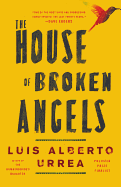
The Mexican American family in Luis Alberto Urrea's richly rendered novel The House of Broken Angels is distinctly American: a melting pot of cultures, languages and individuals united in a common dream of perseverance. The novel's protagonist, "Big Angel" de La Cruz, stricken with cancer and bound to a wheelchair, celebrates what will be his last birthday with his children, grandchildren and extended family. Relatives have already converged on San Diego for the funeral of Big Angel's mother, and he's determined to survive just a bit longer, to offer a day of joy and remembrance instead of another funeral.
In this emotional dynamic of impending death, the history of the de La Cruz family unfurls. Big Angel recalls his childhood on Mexico's Baja Peninsula, his courtship with his future wife and the picaresque shenanigans of his philandering father. Paralleling Big Angel's story are those of his children and extended family. His daughter Minnie is tough-minded and takes care of her father. His son Lalo, an Iraq War veteran, is less resilient, struggling with drugs and crime. Big Angel's two stepsons propel the plot forward as their past involvement in gang violence catches up to the entire family. And the relationship between Big Angel and his younger half-brother, "Little Angel," who is part gringo, provides the novel's funniest and most tender moments.
The House of Broken Angels is a big-hearted family saga. It captures "the golden bubble available to everyone," that is, the warm inner gratitude for life that follows grief. "Love is the answer," Big Angel tells his daughter. "Nothing stops it. Not borders. Not death." --Scott Neuffer, writer, poet, editor of trampset

